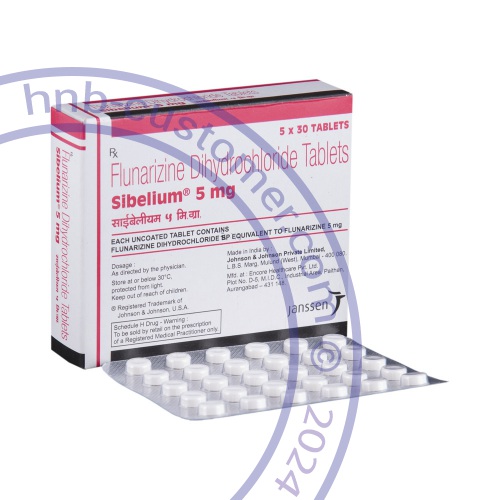Sibelium®
Flunarizine
Flunarizine tablets
What is this medicine?
Sibelium 5mg Tablet is a medicine used for the prevention of migraines. However, it cannot treat an acute attack and will only work to prevent migraines for as long as you continue to take the medicine. This medicine relaxes the brain, preventing migraine headaches.
How should I take this medicine?
Sibelium 5mg Tablet may be taken with or without food. However, it is advised to take it at the same time each day as this helps to maintain a consistent level of medicine in the body. Do not skip any doses and finish the full course of treatment even if you feel better and if you have missed a dose, take it as soon as you remember. You should continue to take this medicine for as long as the doctor advises and do not stop taking it suddenly.
What may interact with this medicine?
There may be an interaction between flunarizine and any of the following:
- alcohol
- anticonvulsants
- tranquilizers
If you are taking any of these medications, speak with your doctor or pharmacist. Depending on your specific circumstances, your doctor may want you to:
- stop taking one of the medications,
- change one of the medications to another,
- change how you are taking one or both of the medications, or
- leave everything as is.
An interaction between two medications does not always mean that you must stop taking one of them. Speak to your doctor about how any drug interactions are being managed or should be managed.
Medications other than those listed above may interact with this medication. Tell your doctor or prescriber about all prescription, over-the-counter (non-prescription), and herbal medications you are taking. Also tell them about any supplements you take. Since caffeine, alcohol, the nicotine from cigarettes, or street drugs can affect the action of many medications, you should let your prescriber know if you use them.
What side effects may I notice from this medicine?
Most side effects do not require any medical attention and disappear as your body adjusts to the medicine. Consult your doctor if they persist or if you’re worried about them
- Sleepiness
- Weight gain
- Muscle pain
- Fatigue
- Constipation
- Nausea
- Insomnia (difficulty in sleeping)
- Runny nose
- Increased appetite
- Depression
- Stomach discomfort
- Breast pain













